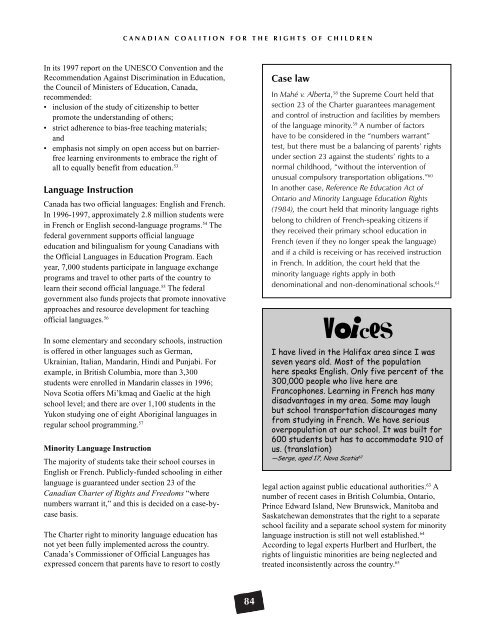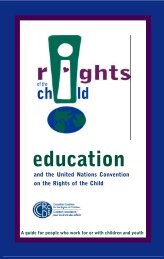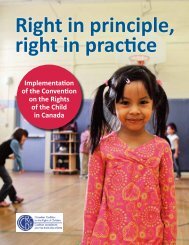Poste - Canadian Coalition for the Rights of Children
Poste - Canadian Coalition for the Rights of Children
Poste - Canadian Coalition for the Rights of Children
You also want an ePaper? Increase the reach of your titles
YUMPU automatically turns print PDFs into web optimized ePapers that Google loves.
C A N A D I A N C O A L I T I O N F O R T H E R I G H T S O F C H I L D R E N<br />
In its 1997 report on <strong>the</strong> UNESCO Convention and <strong>the</strong><br />
Recommendation Against Discrimination in Education,<br />
<strong>the</strong> Council <strong>of</strong> Ministers <strong>of</strong> Education, Canada,<br />
recommended:<br />
• inclusion <strong>of</strong> <strong>the</strong> study <strong>of</strong> citizenship to better<br />
promote <strong>the</strong> understanding <strong>of</strong> o<strong>the</strong>rs;<br />
• strict adherence to bias-free teaching materials;<br />
and<br />
• emphasis not simply on open access but on barrierfree<br />
learning environments to embrace <strong>the</strong> right <strong>of</strong><br />
all to equally benefit from education. 53<br />
Language Instruction<br />
Canada has two <strong>of</strong>ficial languages: English and French.<br />
In 1996-1997, approximately 2.8 million students were<br />
in French or English second-language programs. 54 The<br />
federal government supports <strong>of</strong>ficial language<br />
education and bilingualism <strong>for</strong> young <strong>Canadian</strong>s with<br />
<strong>the</strong> Official Languages in Education Program. Each<br />
year, 7,000 students participate in language exchange<br />
programs and travel to o<strong>the</strong>r parts <strong>of</strong> <strong>the</strong> country to<br />
learn <strong>the</strong>ir second <strong>of</strong>ficial language. 55 The federal<br />
government also funds projects that promote innovative<br />
approaches and resource development <strong>for</strong> teaching<br />
<strong>of</strong>ficial languages. 56<br />
In some elementary and secondary schools, instruction<br />
is <strong>of</strong>fered in o<strong>the</strong>r languages such as German,<br />
Ukrainian, Italian, Mandarin, Hindi and Punjabi. For<br />
example, in British Columbia, more than 3,300<br />
students were enrolled in Mandarin classes in 1996;<br />
Nova Scotia <strong>of</strong>fers Mi’kmaq and Gaelic at <strong>the</strong> high<br />
school level; and <strong>the</strong>re are over 1,100 students in <strong>the</strong><br />
Yukon studying one <strong>of</strong> eight Aboriginal languages in<br />
regular school programming. 57<br />
Minority Language Instruction<br />
The majority <strong>of</strong> students take <strong>the</strong>ir school courses in<br />
English or French. Publicly-funded schooling in ei<strong>the</strong>r<br />
language is guaranteed under section 23 <strong>of</strong> <strong>the</strong><br />
<strong>Canadian</strong> Charter <strong>of</strong> <strong>Rights</strong> and Freedoms “where<br />
numbers warrant it,” and this is decided on a case-bycase<br />
basis.<br />
The Charter right to minority language education has<br />
not yet been fully implemented across <strong>the</strong> country.<br />
Canada’s Commissioner <strong>of</strong> Official Languages has<br />
expressed concern that parents have to resort to costly<br />
84<br />
Case law<br />
In Mahé v. Alberta, 58 <strong>the</strong> Supreme Court held that<br />
section 23 <strong>of</strong> <strong>the</strong> Charter guarantees management<br />
and control <strong>of</strong> instruction and facilities by members<br />
<strong>of</strong> <strong>the</strong> language minority. 59 A number <strong>of</strong> factors<br />
have to be considered in <strong>the</strong> “numbers warrant”<br />
test, but <strong>the</strong>re must be a balancing <strong>of</strong> parents’ rights<br />
under section 23 against <strong>the</strong> students’ rights to a<br />
normal childhood, “without <strong>the</strong> intervention <strong>of</strong><br />
unusual compulsory transportation obligations.” 60<br />
In ano<strong>the</strong>r case, Reference Re Education Act <strong>of</strong><br />
Ontario and Minority Language Education <strong>Rights</strong><br />
(1984), <strong>the</strong> court held that minority language rights<br />
belong to children <strong>of</strong> French-speaking citizens if<br />
<strong>the</strong>y received <strong>the</strong>ir primary school education in<br />
French (even if <strong>the</strong>y no longer speak <strong>the</strong> language)<br />
and if a child is receiving or has received instruction<br />
in French. In addition, <strong>the</strong> court held that <strong>the</strong><br />
minority language rights apply in both<br />
denominational and non-denominational schools. 61<br />
Voices<br />
I have lived in <strong>the</strong> Halifax area since I was<br />
seven years old. Most <strong>of</strong> <strong>the</strong> population<br />
here speaks English. Only five percent <strong>of</strong> <strong>the</strong><br />
300,000 people who live here are<br />
Francophones. Learning in French has many<br />
disadvantages in my area. Some may laugh<br />
but school transportation discourages many<br />
from studying in French. We have serious<br />
overpopulation at our school. It was built <strong>for</strong><br />
600 students but has to accommodate 910 <strong>of</strong><br />
us. (translation)<br />
—Serge, aged 17, Nova Scotia62 legal action against public educational authorities. 63 A<br />
number <strong>of</strong> recent cases in British Columbia, Ontario,<br />
Prince Edward Island, New Brunswick, Manitoba and<br />
Saskatchewan demonstrates that <strong>the</strong> right to a separate<br />
school facility and a separate school system <strong>for</strong> minority<br />
language instruction is still not well established. 64<br />
According to legal experts Hurlbert and Hurlbert, <strong>the</strong><br />
rights <strong>of</strong> linguistic minorities are being neglected and<br />
treated inconsistently across <strong>the</strong> country. 65




